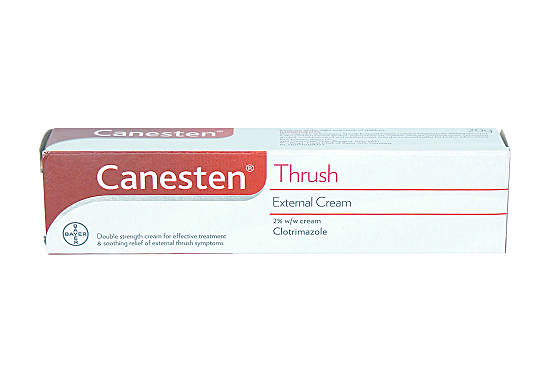Recurring Thrush

Medically reviewed by
Dr Kathryn BasfordLast reviewed: 11 Apr 2019
Why do I keep getting thrush?

Thrush is a common yeast infection caused by a fungus called Candida albicans. The infection affects both men and women, and is usually harmless. But, thrush can cause uncomfortable symptoms and can come back repeatedly.
Even though thrush can technically be passed on during sex, it isn’t classed as a sexually transmitted infection (STI). Thrush grows well in warm, moist areas, which is why it can be found commonly in the vagina, mouth, armpit, and groin areas.
What is recurring thrush?
Thrush counts as recurring if you have four or more cases of it in one year. There are many reasons why thrush may keep coming back. Your doctor will be able to help you identify possible causes of your recurrent thrush, which could help you to make changes to stop it coming back as often in the future. If you do have recurring thrush, you may need to take a longer course of treatment.
Who is likely to get recurring thrush?
There are many reasons why someone’s thrush keeps returning. Some possible reasons for recurring thrush include:
- pregnancy
- wearing tight clothing such as skinny jeans
- wearing synthetic underwear or clothing
- using products which may irritate sensitive areas, like perfumed shower gel, bubble bath, or vaginal deodorant
- chemotherapy
- taking antibiotics
- uncontrolled diabetes
- HIV and other immune system disorders
- not finishing a course of thrush treatment
- the female menstrual cycle
- hormonal or vaginal pH changes
Why do I keep getting thrush?
There are several explanations for why you might keep getting thrush.
Sometimes the treatment given for thrush doesn’t always clear the whole infection up and this can be a reason it comes back. So, it’s really important that you finish the full course of any thrush treatments you use, even if it looks like the infection has gone away. You may think because the symptoms have disappeared the infection has cleared up, but this may not be the case.
People who are diabetic are likely to get thrush because high blood sugar levels means better conditions for the fungus to grow. Plus, a symptom of diabetes is excessive thirst, and a dry mouth alongside high blood sugar levels makes your saliva an ideal place for the thrush infection to grow.
People who have an immune disorder or have a weakened immune system are also more likely to get thrush. Stress can cause a drop in the body’s immune system response. So, if you’re stressed, your body finds it harder to fight off a thrush infection. Stress also causes the levels of the hormone cortisol to rise, which leads to higher blood sugar levels. So like in someone with diabetes, the increase in sugar means the thrush fungi can thrive, and at the same time the body struggles to naturally fight it off.
If you’re a woman, you’re more likely to get thrush just before your period starts, because of your hormone levels changing, along with your vaginal pH and bacteria levels. Sanitary products can also cause irritation which leads to the thrush infection. In addition, if you clean your vagina more often during your period, you may be washing away the good bacteria it needs to naturally cleanse itself.
from £15.99
from £15.99
from £17.99

No results found.
Please check your spelling or try another treatment name.
Can having thrush over and over cause any long-term damage?
Even though thrush outbreaks can be uncomfortable and irritating, they don’t cause any long-term damage. But, you may need a longer course of anti-thrush treatment, because the fungi that cause thrush can become resistant. So over time, treatment may not work as effectively or even stop working altogether.
On the other hand, thrush fungus becoming resistant to treatment doesn’t happen very often, and most of the time if treatment doesn’t work, it’s usually because the full course isn’t being completed properly.
Can you keep using thrush treatment, long-term?
It’s normally safe to use thrush treatment repeatedly to treat your thrush infections. If your infection doesn’t clear up after one course of treatment, you should see a doctor before starting another one.
Normally, a thrush infection will clear up in a week, but you may need to use the antifungal treatment for up to 14 days. It’s essential that you finish every course of treatment completely, even if you think your symptoms have cleared up. If you don’t, you will increase the chance of the infection coming back.
If you have recurrent thrush, you may be advised to take the anti-thrush treatment for longer, possibly for up to six months. Long-term treatment with antifungal medication can lead to the fungi becoming resistant to treatment. But, your doctor will check this for you.
Can you cure thrush completely?
A thrush infection will sometimes clear up on it’s own, or it can be treated with antifungal medications. These medications help to clear the Candida yeasts that are causing the infection. But, since Candida is a yeast that naturally lives on your skin, it’s possible for it to cause another infection in the future.
How to avoid getting thrush again?
You can keep the risk of developing the infection down by:
- avoiding eating too much food with high sugar contents
- reducing stress and maintaining a healthy lifestyle
- avoiding tight-fitting clothes and underwear
- changing your underwear right after exercise
- avoiding using perfumed soaps and deodorants on your genitals
- having showers instead of baths
- changing sanitary pads and tampons regularly when you’re on your period
- avoiding sex until a current infection has cleared up
- fully completing any courses of thrush treatment
- using water and emollients (moisturisers) to clean your penis or vagina, instead of soap

Dr Kathryn Basford is a qualified GP who works as a GP in London, as well as with ZAVA. She graduated from the University of Manchester and completed her GP training through Whipps Cross Hospital in London.
Meet our doctorsLast reviewed: 11 Apr 2019
-
Diabetes Digital Media Ltd. (2019). Thrush. [online] Available at: https://www.diabetes.co.uk/diabetes-complications/diabetes-and-yeast-infections.html [accessed 22nd March 2019].
-
Mayer, F. L. et al (2013). Candida albicans pathogenicity mechanisms. Virulence, Jan; 15: 119-128. [online] Available at: https://pubmed.ncbi.nlm.nih.gov/23302789/.[accessed 13th May 2021]
-
NHS (2017). Thrush in men and women. [online] Available at: https://www.nhs.uk/conditions/thrush-in-men-and-women/ [accessed 22nd March 2019].
-
NHS Inform. (2019). Oral thrush in adults. [online] Available at: https://www.nhsinform.scot/illnesses-and-conditions/infections-and-poisoning/oral-thrush-in-adults [accessed 22nd March 2019].
-
Nola, I. et al (2003). Candida infections today – how big is the problem? Acta Dermatovenerol Croat, Jun; 11: 171-177. [online] Available at: https://pubmed.ncbi.nlm.nih.gov/12967510/. [accessed 13th May 2021]











